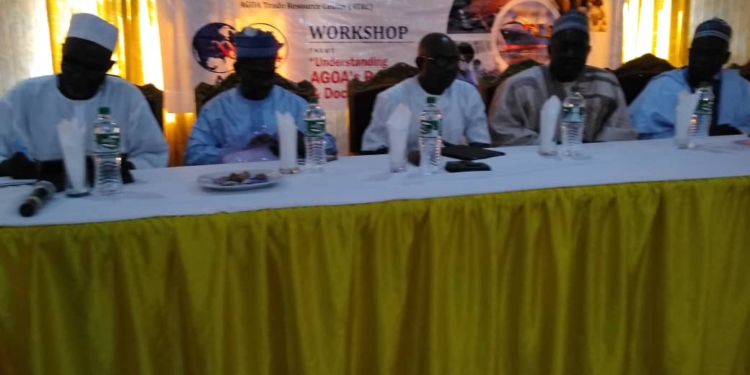The Executive Director/CEO of the Nigerian Export Promotion Council, NEPC, Mr. Segun Awolowo, urges exporters and intending exporters to utilize and maximize the benefits they could derive from Africa Growth and Opportunity Act (AGOA).
Awolowo made this known during his opening remark at a sensitisation program and capacity building workshop in Kano which is aimed at giving participants the opportunity to know about AGOA; the procedures and documentation to export under the scheme.
The NEPC CEO said the programme is to set the perspectives right that AGOA is not ambiguous but understandable, urging exporters to take advantage of the scheme.
Awolowo, who was represented at the event by the Regional Coordinator, NEPC, Lagos, Mr. Babatunde Faleke, added that the Federal Ministry of Industry, Trade and Investment is the apex body promoting trade and AGOA in Nigeria but the NEPC is not resting on its oars and as part of the Council’s mandate, has decided to extend the programme to Kano.
“The purpose of our coming to Kano is to inform participants and exporters on what they need to know and do to take advantage of the exportable products currently 6,500 which they can export legitimately under AGOA,” he said.
Also at the event, Regional Coordinator of the NEPC North West, Mr. Balla Hassan said the training is a partnership between the South West and the North West Regions of the NEPC.
“Companies in the South West have benefited and exported under AGOA, while the companies in the north have not benefited much,” he said, adding that, “AGOA is seen as a game changer, exporters/participants should take advantage and ask relevant questions to further their trade operations. He also welcomed new exporters to the forum,” he said.
Commenting on the large turnout of participants at the workshop, Hassan said, “The turnout was large because exporters know that the mobilisation was aimed at attracting people that will diversify the economy. People were eager to attend so that they may know what they need to do.”
On his efforts for food processors, commodity associations and farmers to take advantage of AGOA before the Act’s expiration, Hassan said his office often carry out programmes to sensitise the exporters in his region.
“We do a one-on-one visit to exporters, hold sensitization programmes just like the AGOA programme, and encourage exporters to form clusters and have equipment to process in bulk. Meanwhile, finance is a major problem because stringent measures are involved in getting facilities from banks,” he said.
Talking about exporters’ inability to mass produce for export which is another challenge, Hassan said, “His office encourages exporters with similar products to form cooperatives for their products and NEPC finds off-takers for the products like the Hibiscus Export Expansion Programme, where Ms Toyin Kolawole signed an MOU with Jigawa State Government to supply 70 containers of Hibiscus Flower. Hibiscus is collected from various places, cleaned and moved to a particular warehouse for packing into containers.”
He also stressed the Jigawa State government’s involvement in the employment of women who cleans and pack the hibiscus for sale.
In her own presentation, Head AGOA Trade Resource Centre, Lagos, Mrs. Bolanle Emmanuel at the event engaged the exporters on Understanding AGOA: Export Procedures and Documentation.
She enjoined the participants to approach NEPC for registration and seek counsel before stepping out to export their products.
She said exporters and would-be exporters after seeking counsel should decide on what they want to export. “Know the product(s), ensure it is AGOA eligible, know required products certification(s) and follow specification of buyers,” she said.
“Do your market research, Identify and follow the specifications and quality standards for the Product, produce good quality products in volumes and at competitive prices. Comply with GAP and GMP for food labeling, packaging, markings and distribution units. Identify and follow the specifications and distribution,” she said.
Stating further, she said the products must meet international standards. “Ensure you meet international standards, ensure transportation and logistics systems are in place on consistent basis.
“Find an agent or importer in the US. Choose a good freight forwarder in Nigeria and a good Customs Broker in the US. Make timely delivery; Support your shipment with genuine documents and take bold step to export.”

